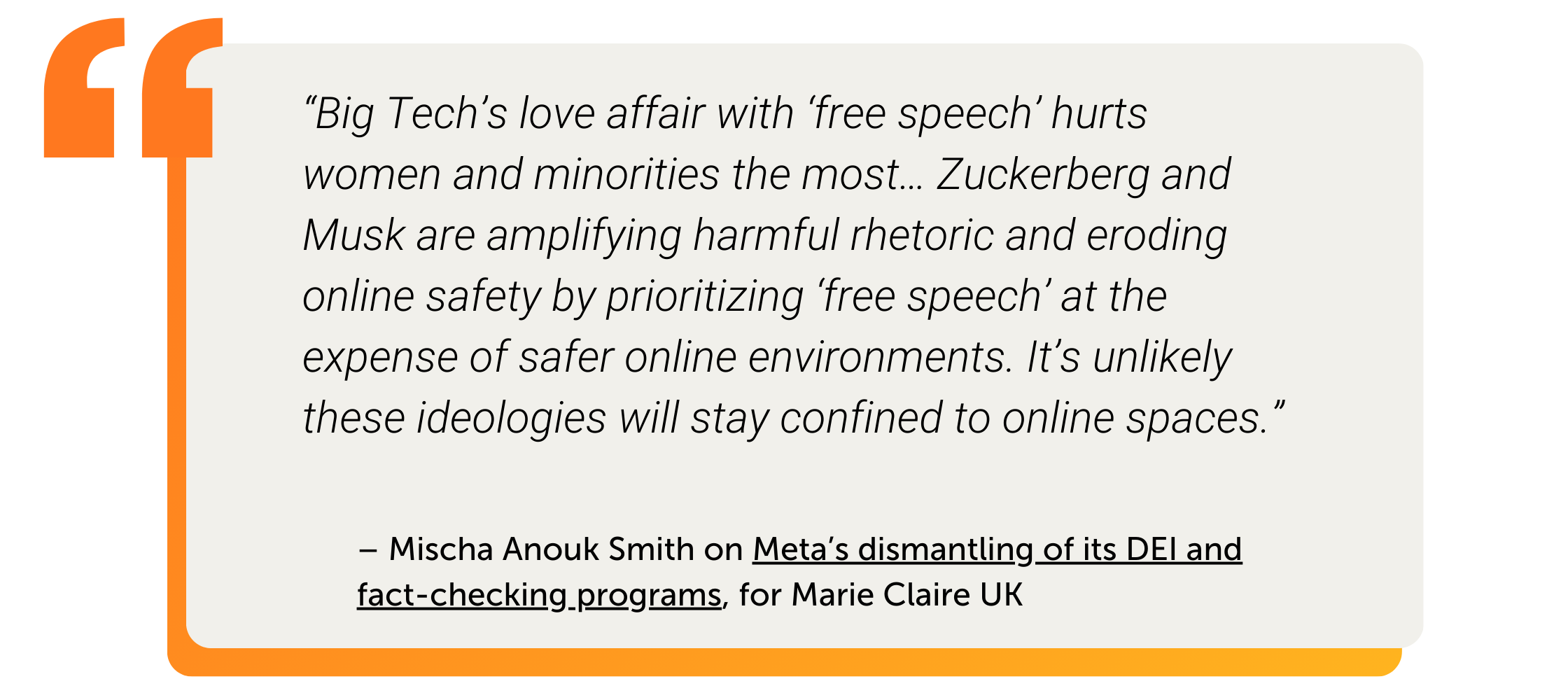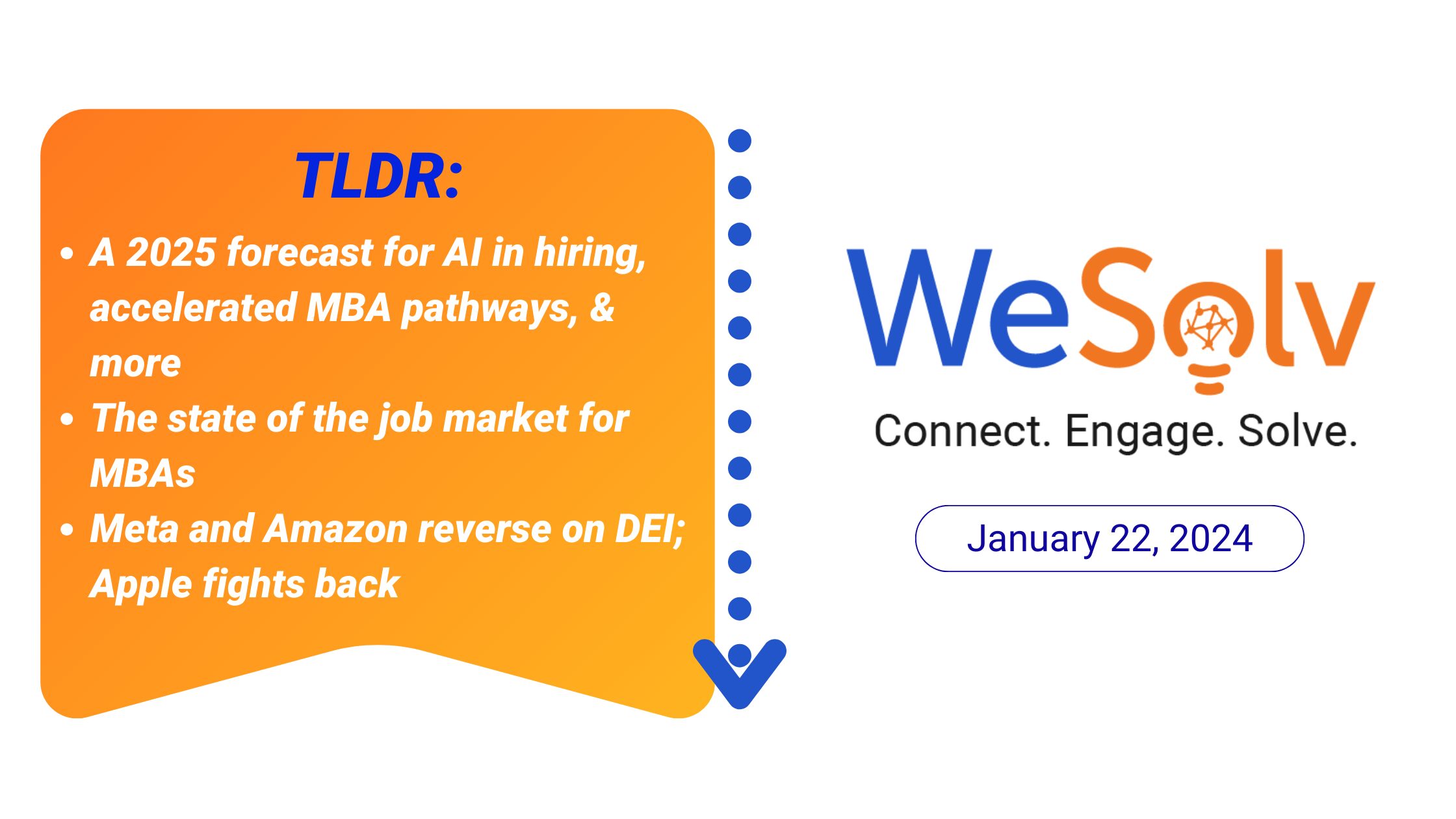Welcome to WeSolv’s monthly newsletter for our employer and university partners! Here, we’ll break down trending DEI x hiring news and equip you with the insights you need to support, attract, and hire talented underrepresented advanced degree candidates. Click here to receive these newsletters directly to your inbox each month.
2025 is just getting started, but big changes are already reshaping inclusive hiring and MBA programs.
Political and economic uncertainty has companies rethinking how they hire for skills and approach DEI—whether that means working to future-proof their DEI strategies or, in the recent cases of Meta and Amazon abandoning them despite backlash. (Case in point: Anger over Mark Zuckerberg’s claim corporate America needs more “masculine energy” even though men run 89% of Fortune 500 companies. 🙄)
Meanwhile, a need for upskilling and reskilling is fueling growth to MBA programs—applications were up 32% for full-time programs in 2024—but universities are also under pressure to prove their value, especially in preparing candidates for AI-driven workplaces.
For HR leaders and university administrators, 2025 is about more than reacting to change—it’s about sustainably shaping it. Companies that flip-flop under political pressure risk losing the trust of employees, students, and consumers. By keeping clear-headed and getting more strategic with our investments in inclusive hiring processes and curricula, we can adapt and stay future-ready, no matter the external climate.
So, what strategic shifts should we expect in 2025? And how can we lead those changes with confidence? Below, we’ll explore key predictions for how the most adaptable organizations will step up this year.
To ending 2025 stronger than we start it,
Stella Ashaolu
CEO and Founder, WeSolv

1. We’ll get real about AI in hiring.
AI may be the shiny new tool in talent acquisition, but it can’t solve every TA challenge. As the novelty of AI starts to fade, we’ll take a more practical approach.
Yes, AI can streamline resume screening and reduce admin work. But can it completely remove bias and uncover talent that’s as strong off paper as on? At the end of the day, that’s where humans will always be needed. The best hiring teams in 2025 will zero in on strategic, specific uses of AI that actually deliver ROI—like blind screening and diversity analytics—rather than adopting AI just to adopt it.
2. Fast-track MBA programs will keep growing.
Accelerated MBA programs are booming—growing 62% in the U.S., Canada, and Latin America since 2019. Why? They’re a win-win. Universities need them to recover from two-year program enrollment dips, and candidates love the flexibility.
A one-year program means professionals can keep upskilling without putting their careers (or finances) on hold for too long. Plus, offering both virtual and in-person options helps attract a more diverse mix of students. Expect to see more schools doubling down on these flexible pathways.
3. Companies will get clearer on the skills they actually need.
Skills-based hiring sounds great—but it only works if companies truly know what skills they’re looking for. Right now, many job descriptions read like wish lists, which frustrates hiring teams and deters great candidates.
In 2025, the most forward-thinking companies will refine their hiring needs, balancing day-to-day functional skills with innovation and adaptability. And they’ll use smarter hiring methods—like real-world projects (we call them Case Challenges)—to assess skills in action instead of just on paper.
4. L&D will get the investment it deserves.
Learning and development (L&D) has been a buzzword for years, but it’s often underfunded. That’s about to change.
In 2025, competitive companies will move beyond occasional training sessions and certification reimbursements. Instead, they’ll embrace gamification, interactive learning, and microlearning—delivering bite-sized lessons that fit seamlessly into the workday. AI-powered skills assessments will also help create personalized learning paths, ensuring employees build skills that match both their career goals and the company’s evolving needs.
5. MBA programs will focus more on entrepreneurship and intrapreneurship.
Traditional MBA programs have centered on core business disciplines, like marketing and finance, to prep students for leadership roles at established corporations. But that’s shifting. A third of MBA students now say they want to develop entrepreneurial skills, and at Stanford, 23% of 2024 grads started their own business post-MBA.
This year, expect to see more startup incubators, pitch competitions, and corporate innovation courses popping up at business schools. At the same time, companies will do more to attract intrapreneurs—those who want to innovate within established organizations—by offering more dynamic, fast-moving career paths.
It’s going to be a big year for both hiring and higher ed. Find more 2025 insights for hiring teams and university leaders on the blog.
———————————————————-


———————————————————–

➡️ Executive orders on DEI and gender. On Donald Trump’s first day in office, he did what many have feared he would do: terminate DEI programs, which he called “illegal and immoral discrimination,” at government agencies and roll back protections for transgender folks. As alarming as these measures are, we need to remember that Trump does not have the power to target DEI at private employers and universities and that we can expect legal challenge to many of his orders, including those that contradict established protections for LGBTQ+ folks. (More.)
➡️ Ghost jobs are scarily real. The jobs board Greenhouse shared data showing that a whopping 70% of “hiring” employers used its platform to post a ghost job — or, an opening where no candidate is ever hired. 19% of jobs posted in Q2 of 2024 alone were ghost jobs, per Greenhouse, and 15% of companies were “repeat offenders.” Budget cuts and hiring internal candidates may be factors behind this. So could efforts to pad talent pipelines and signal artificial growth. (More.)
➡️ “Inappropriate” and “restricting.” That’s what Apple calls a proposal to scrap its DEI practices and policies, which a conservative activist group plans to submit at the company’s annual shareholder meeting in February. Going against the recent likes of Meta and Amazon, Apple’s board of directors has recommended shareholders to vote against the proposal, as its policies are “foundational to how we do business.” (More.)
➡️ Connection, gamified. That’s the goal of KPMG’s Culture Champions Network, a platform that rewards employees for participating in business resource group events, mentoring sessions, volunteer work, nonprofit board service, and L&D. And it seems to be working: the platform is actively used by over 9K U.S. employees.(More.)
➡️ A tougher job market for MBAs. That’s the grim conclusion of 2024 numbers reported by the Economist. They found that, at the top 15 business schools, the share of MBA grads who accepted a job offer within three months of graduating fell 6% in 2024 and 8% compared to the past five year’s average. One potential solution for grads in this climate? Search funds. (More.)
———————————————————————————–

📕 Share it with students: 10 Goals Every MBA Candidate Should Set for the New Year.
📕 5 Questions to Ask Before Finalizing Your 2025 Hiring Plan, starting with: What skills are critical to this year’s goals?
📕 Set Students Up For Success in 2025 with this 10-part checklist.
ghj

